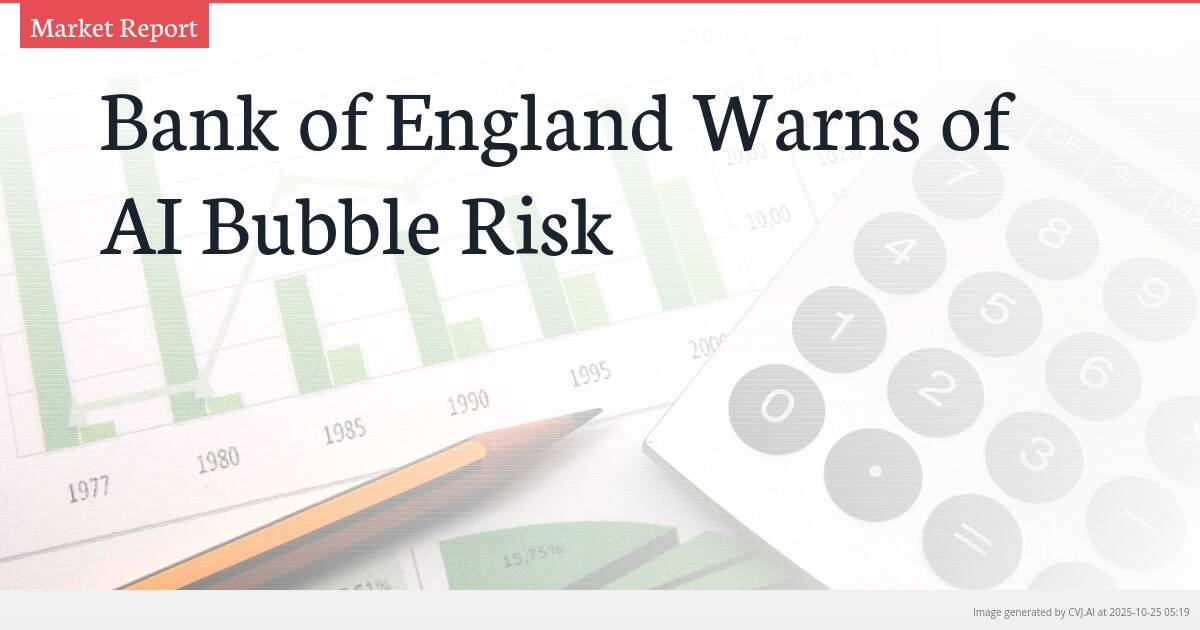This summary text is fully AI-generated and may therefore contain errors or be incomplete.
Introduction
The Bank of England is investigating growing concerns that financiers’ lending to data centers could spark an AI bubble similar to the dot-com crash. UK regulators are examining market risks as AI companies face lofty valuations, with the central bank warning that many firms could collapse in a major correction reminiscent of the early 2000s technology bubble.
Key Points
- Central bank examining financiers' data center lending as AI speculation
- Warns of potential market correction similar to dot-com bubble crash
- Investigating relationship between AI companies and financial backers
Central Bank Sounds Alarm on AI Speculation
The Bank of England has launched a formal investigation into the surge of financiers lending to data centers as a speculative bet on artificial intelligence’s future, according to Bloomberg reporting. The United Kingdom’s central bank is examining whether this lending boom represents a dangerous bubble in the making, with parallels to the dot-com crash that devastated financial markets in the early 2000s. This scrutiny comes as AI companies continue to attract massive investments despite questions about their ability to justify current valuations.
The central bank’s concern centers on the relationship between AI companies and financial institutions that are aggressively placing bets in the AI market. Regulators are particularly worried that excessive lending to data center projects—often justified by optimistic projections about AI adoption—could create systemic risks if the technology fails to deliver on its promised returns. The Bank of England’s investigation represents one of the most significant regulatory responses to the AI investment frenzy that has captivated global markets.
Echoes of Dot-Com Bubble Concerns
The Bank of England’s warning draws direct comparisons to the dot-com bubble, when excessive speculation in internet companies led to a massive market correction. Between 1995 and 2000, the NASDAQ composite index rose 400% as investors poured money into any company with an internet-related business model, only to watch the index fall 78% from its peak by 2002. The central bank fears that similar irrational exuberance is now driving AI investments, with financiers lending to data centers without adequate due diligence about their long-term viability.
What makes the current situation particularly concerning to UK regulators is the scale of capital flowing into AI infrastructure. Data centers require massive upfront investments, and the Bank of England is examining whether lenders are properly assessing the risks associated with these projects. The central bank has already been examining market risks that could arise if AI companies fail to meet their lofty valuations, warning that many could come crashing down in a correction that would ripple through the broader financial system.
The parallel to the dot-com era extends beyond mere valuation concerns. During the internet bubble, many companies with minimal revenue and unproven business models achieved billion-dollar valuations based on future potential rather than current performance. The Bank of England’s investigation suggests regulators see similar patterns emerging in the AI sector, where companies are being valued on technological promise rather than demonstrated commercial success.
Systemic Risks and Regulatory Response
The Bank of England’s focus on the relationship between AI companies and their financial backers represents a sophisticated approach to identifying potential systemic risks. By examining how financiers are lending to data centers as a way to speculate on AI’s future, regulators hope to understand the transmission mechanisms that could amplify a correction in AI valuations throughout the broader financial system. This investigation goes beyond traditional company-specific risk assessment to consider how interconnected lending practices could create contagion effects.
According to the Bloomberg report that prompted the Bank of England’s scrutiny, the central bank is particularly concerned about the concentration of lending to data center projects and whether financial institutions have adequate safeguards against potential defaults. The investigation will examine whether lenders are properly stress-testing their AI-related portfolios against scenarios where AI adoption progresses more slowly than expected or where technological breakthroughs fail to materialize as projected.
The United Kingdom’s proactive stance on AI bubble risks places it at the forefront of international regulatory efforts to address potential financial stability concerns arising from technological speculation. While other central banks have noted the rapid growth in AI investments, the Bank of England appears to be taking a more systematic approach to understanding and potentially mitigating the risks. The outcome of this investigation could shape regulatory approaches to emerging technology investments globally, particularly as other nations grapple with similar concerns about AI valuation bubbles.
📎 Read the original article on cointelegraph.com

